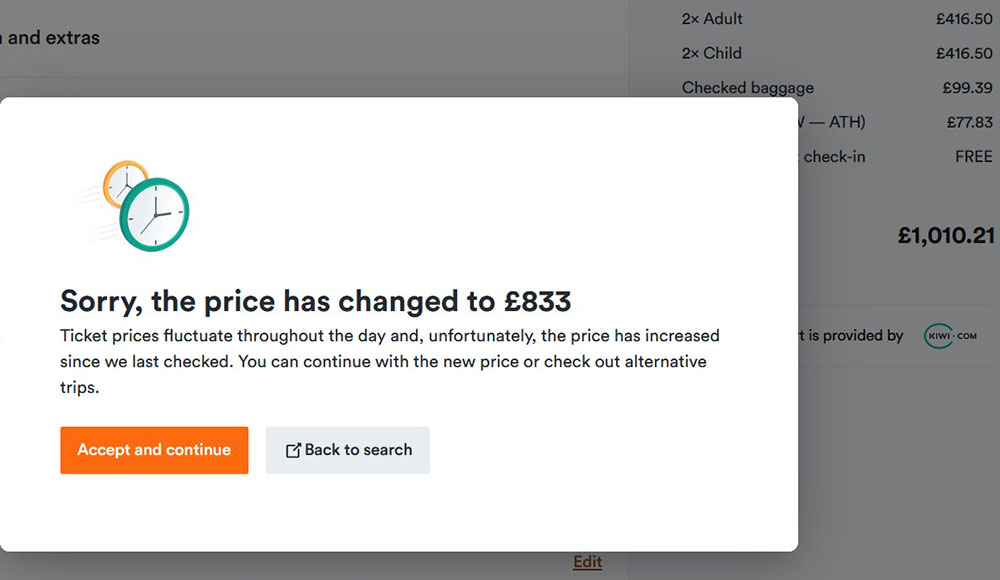Add-ons, cookies, seating: 5 sneaky rip-offs you’ll face when booking a holiday online

From charging extra to sit together to ratcheting up the price right before you pay, there are all sorts of nasty tricks holiday firms employ to rip us off when booking a trip.
As the nights draw in, many people will be thinking about heading abroad for a change of scenery.
Of course, covering the cost of a trip is not necessarily straightforward, particularly given the rising cost of virtually all of our outgoings.
That’s even more clear when you consider the handful of sneaky tricks that travel firms exploit which drive up how much we have to pay for that holiday, potentially without us even realising it.
You actually want to take luggage with you?
One of the classic additional fees that can ratchet up the cost of your break concerns your luggage.
While you might be able to get away with just hand luggage if you’re having a day or two away on a city break, for longer trips you’re going to need to take proper suitcases with you.
And that’s where the holiday can start to become more expensive than it first appears on that price comparison site.
Because different airlines have their own rules around what sort of luggage is included as standard, and what you may need to pay more for.
If you happen to have booked with a particularly stingy airline or dared to take a couple of extra outfits for those nights out, then you can quickly exceed the standard allowance and find yourself having to cough up extra.
As a result, when booking your trip, be sure to take the time to work out what’s included and how your existing suitcases measure up.
We want to sit together
Want to sit with your loved ones on your flight?
Apparently, that is a luxury that you’ll need to cough up for.
We went through it on a holiday last year, where we felt compelled to shell out a significant sum just to guarantee that we had four seats next to each other.
And this wasn’t a ‘budget’ airline that you might associate with such add-on charges, but British Airways.
While airlines will typically have rules around children so that they are not sat with strangers, there are different rules around what age you have to be to qualify, while you can still end up with your party at opposite ends of the plane.
If you want to travel together, then it’s another fee to consider on top of the headline price.
Do you want fries with that?
One seeming inevitability when shopping online is the amount of upselling that takes place.
It’s not enough to select a specific item or service you want, you also have to outright turn down a whole host of additional extras that the retailer is trying to flog you.
Rarely is this more apparent than when booking a holiday, however.
It’s not just the add-ons that we have all become familiar with from budget airlines, like priority boarding or baggage, but a whole host of other extras too.
You’ll be pushed to take out insurance through them ‒ which is always significantly more expensive than if you purchase it independently ‒ or simply just a ‘cancellation’ policy in case you need to scrap your plans.
Then you’ll be bombarded with options over transfers to and from the hotel, and whether you want to shell out extra for a ‘premium’ car rather than a standard one, or perhaps simply rent a car for your trip.
What starts out feeling exciting ‒ booking a trip away somewhere new, a bit of sun and relaxation ‒ quickly starts to feel like a slog as you fend off the barrage of additional extras and upselling.
Not only does it take the gloss off what should be a fun experience, in plenty of cases people will sign up to some of these extras without realising it, or give in before they have essentially been broken down by the bombardment.
Check your cookies
One particularly sneaky tactic that has emerged in recent years has been the way that some travel operators make use of your internet history.
If you use a device that has a record of similar searches for holidays in its internet history, then you may find you are quoted higher prices.
Essentially, the websites know that this is a repeat search and that you are therefore more interested in the trip than someone searching for the first time, and so use this to crank up the prices quoted.
If you delete your cookies and then search again, you may find that the prices you are quoted for the trip are substantially cheaper.
Along similar lines, and as we have highlighted previously on loveMONEY, you may find that you are charged more simply because the travel firm works out you are based in the UK and could cut the cost of your trip by utilising a VPN service.
The final flourish
Even once you get through all of this nonsense, there may be a final rip-off to deal with.
Members of the loveMONEY team have found that even after you've gone through the various booking stages, entered the details of the various passengers, and said no to all of the additional upselling, then you could still get a popup just before you pay telling you that the cost of the trip has been hiked for seemingly no reason.

It doesn’t matter if you delete your cookies, choose a different time of day for your search, use a different device or even switch to a different flight comparison website ‒ we’ve seen it happen repeatedly.
It’s a dreadful, disheartening experience and yet another reminder that you can’t believe the quoted cost until you reach the final point of paying for your trip.
Comments
Be the first to comment
Do you want to comment on this article? You need to be signed in for this feature